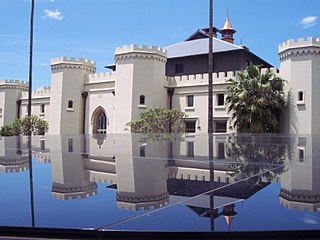Computer music is the application of computing technology in music composition, to help human composers create new music or to have computers independently create music, such as with algorithmic composition programs. It includes the theory and application of new and existing computer software technologies and basic aspects of music, such as sound synthesis, digital signal processing, sound design, sonic diffusion, acoustics, electrical engineering, and psychoacoustics. The field of computer music can trace its roots back to the origins of electronic music, and the first experiments and innovations with electronic instruments at the turn of the 20th century.
Multimedia is a form of communication that uses a combination of different content forms such as writing, audio, images, animations, or video into a single interactive presentation, in contrast to traditional mass media, such as printed material or audio recordings, which features little to no interaction between users. Popular examples of multimedia include video podcasts, audio slideshows and animated videos. Multimedia also contains the principles and application of effective interactive communication such as the building blocks of software, hardware, and other technologies. The five main building blocks of multimedia are text, image, audio, video, and animation.
Larry Don Austin was an American composer noted for his electronic and computer music works. He was a co-founder and editor of the avant-garde music periodical Source: Music of the Avant Garde. Austin gained additional international recognition when he realized a completion of Charles Ives's Universe Symphony. Austin served as the president of the International Computer Music Association (ICMA) from 1990 to 1994 and served on the board of directors of the ICMA from 1984 to 1988 and from 1990 to 1998.
Electroacoustic music is a genre of popular and Western art music in which composers use technology to manipulate the timbres of acoustic sounds, sometimes by using audio signal processing, such as reverb or harmonizing, on acoustical instruments. It originated around the middle of the 20th century, following the incorporation of electric sound production into compositional practice. The initial developments in electroacoustic music composition to fixed media during the 20th century are associated with the activities of the Groupe de recherches musicales at the ORTF in Paris, the home of musique concrète, the Studio for Electronic Music in Cologne, where the focus was on the composition of elektronische Musik, and the Columbia-Princeton Electronic Music Center in New York City, where tape music, electronic music, and computer music were all explored. Practical electronic music instruments began to appear in the early 20th century.

Max, also known as Max/MSP/Jitter, is a visual programming language for music and multimedia developed and maintained by San Francisco-based software company Cycling '74. Over its more than thirty-year history, it has been used by composers, performers, software designers, researchers, and artists to create recordings, performances, and installations.

The International Computer Music Conference (ICMC) is a yearly international conference for computer music researchers and composers. It is the annual conference of the International Computer Music Association (ICMA).

Live coding, sometimes referred to as on-the-fly programming, just in time programming and conversational programming, makes programming an integral part of the running program.
Distributed creativity is a sociocultural framework for understanding how creativity emerges from the interactions of people, objects and their environment. It is a response to cognitive accounts of creativity exemplified by the widely used four Ps framework. According to Vlad Petre Glǎveanu, "instead of an individual, an objects or a place in which to 'locate' creativity, [the] aim here is to distribute it between people, objects and places."

The Conservatorium High School is a public government-funded, co-educational, selective, secondary day school that specialises in music education. It lies on the western edge of the Royal Botanic Gardens, off Macquarie Street, in Sydney's CBD.
Founded in 1986, La Communauté électroacoustique canadienne / The Canadian Electroacoustic Community (CEC) is Canada's national electroacoustic / computer music / sonic arts organization and is dedicated to promoting this progressive art form in its broadest definition: from "pure" acousmatic and computer music to soundscape and sonic art to hardware hacking and beyond.
Gary Lee Nelson is a composer and media artist who taught at Oberlin College in the TIMARA department. He specializes in algorithmic composition, real-time interactive sound and video along with digital film making.
Rodrigo F. Cádiz is a composer and engineer from the Pontificia Universidad Católica de Chile, where he studied with Alejandro Guarello, Aliosha Solovera and Pablo Aranda. He obtained his Ph.D. in Music Technology from Northwestern University in 2006, where he studied with Augusta Read Thomas, Jay Alan Yim, Virgil Moorefield, Amnon Wolman and Gary Kendall.

The International Communication Association (ICA) is an academic association for scholars interested in the study, teaching and application of all aspects of human and mediated communication.

Computational creativity is a multidisciplinary endeavour that is located at the intersection of the fields of artificial intelligence, cognitive psychology, philosophy, and the arts.
Simon Emmerson is an electroacoustic music composer working mostly with live electronics. He was born in Wolverhampton, UK, on 15 September 1950.
International City/County Management Association is an association representing professionals in local government management. It is based in Washington, D.C., USA.
Jeremy Castro Baguyos is a musician-researcher specializing in the realization of live interactive computer music. Based at the University of Nebraska at Omaha (USA), he is a Professor of Music.
Sound and music computing (SMC) is a research field that studies the whole sound and music communication chain from a multidisciplinary point of view. By combining scientific, technological and artistic methodologies it aims at understanding, modeling and generating sound and music through computational approaches.

François Pachet is a French scientist, composer and director of the Spotify Creator Technology Research Lab. Before joining Spotify he led Sony Computer Science Laboratory in Paris. He is one of the pioneers of computer music closely linked to artificial intelligence, especially in the field of machine improvisation and style modelling. He has been elected ECCAI Fellow in 2014.

Sonic Acts is an interdisciplinary arts organisation for the research, development and production of works at the intersection of art, science and theory. Sonic Acts is also a leading platform for international projects, research and the commissioning and co-production of new artworks, often working together with local and international partner organisations such as independent and institutional cultural incubators, universities and kindred festivals.










